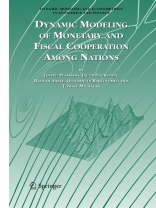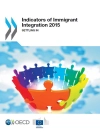Dynamic Modeling of Monetary and Fiscal Cooperation Among Nations analyzes coordination of monetary and fiscal stabilization policies between countries and currency areas using a dynamic game approach. The first four chapters introduce the reader to the dynamics of fiscal and monetary policy cooperation. Issues covered include: fiscal coordination, fiscal stringency requirements, structural and bargaining power asymmetries and the design of monetary and fiscal policymaking in a monetary union. In the four last chapters multiple-player settings with aspects of fiscal and/or monetary coordination are analyzed using the endogenous coalition formation approach. The analysis is focused on shock and model asymmetries and issues of multi-country coordination in the presence of (possibly many) monetary unions.
विषयसूची
International Policy Coordination.- Mathematical Background.- The Basic Symmetric Two-Country Model.- An MU Model with Active Monetary Policy.- Endogenous Coalition Formation Concepts.- A Multi-Country Closed-Economy MU Model.- Accession to a Monetary Union.- World-wide Regional Policy Coordination.- Concluding Remarks.
लेखक के बारे में
Joseph Plasmans is a Professor at the Department of Economics of the University of Antwerp and an extra-ordinary professor at the Department of Econometrics and Operations Research at Tilburg University. He obtained his Ph.D. in Economics at Tilburg University in 1975. He is also Research Fellow at the CESifo institute in Munich. His major research interests include econometrics, multi-country modelling, dynamic games, European integration policies, transition economies, intangible investments and innovation strategies.
Jacob Engwerda is an associate Professor at the Department of Econometrics and Operations Research of Tilburg University. He obtained his Ph.D. in Mathematics from Eindhoven University of Technology in 1988. His major fields of interests are systems and control theory with applications on economics.
Bas van Aarle is an assistant Professor at the University of Maastricht since 2005. Previously, he was employed at the K.U. Leuven. He obtained a Ph.D. in Economics from Tilburg University in 1996. His research interests are multi-country modelling, European integration policies and transition economies.
Giovanni Di Bartolomeo is an assistant Professor of Economic Policy at the University of Rome ‘La Sapienza’ since 2002. Previously, he has been employed at the University of Antwerp for two years. He holds a Master of Science in Economics and Finance from the University of Barcelona Pompeu Fabra and a Ph.D. in Economics from the University of Rome ‘La Sapienza’. He is interested in economic Policy, European Integration and labour markets.
Tomasz Michalak is a research assistant at the Department of Economics of the University of Antwerp since 2003. He holds a Master of Science in International Economics from the University of Warsaw. His research interests are game theory, endogenous coalition formation, international macroeconomics, monetary economics and programming.












